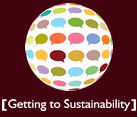In August 2012, the United Nations launched the Sustainable Development Solutions Network (SDSN).
The network mobilises scientific and technical expertise from academia, civil society, and the private sector in support of sustainable-development problem solving at local, national, and global scales. This Solutions Network accelerates joint learning and helps to overcome the compartmentalization of technical and policy work by promoting integrated approaches to the interconnected economic, social, and environmental challenges confronting the world.
The SDSN works closely with multilateral financing institutions, stakeholders including business, civil society, UN agencies and other international organizations to identify and share the best pathways to achieve sustainable development. This initiative is part of the work undertaken in response to the outcome of the Rio + 20 Conference.
The Network is structured around 12 Thematic Groups of global experts that work to identify common solutions and highlight best practices.
They also provide technical support to the High-level Panel of Eminent Persons on the Post-2015 Development Agenda.
The SDSN has started launching Solutions Initiatives projects to pilot or roll-out practical approaches to sustainable development challenges and assist countries in developing sustainable long-term development pathways.
The Solutions Network will be directed by Professor Jeffrey D. Sachs, director of the Earth Institute and Special Advisor to the UN Secretary‐General on the Millennium Development Goals, and will operate in close coordination with the High‐level Panel of Eminent Persons on the Post‐2015 Development Agenda announced by the UN last week.
“The post‐2015 objectives will help the world to focus on the vital challenges of sustainable development,” said UN Secretary‐General BAN Ki‐moon, “and the Sustainable Development Solutions Network will be an innovative way to draw upon worldwide expertise in the campuses, universities, scientific research centres and business technology divisions around the world.”
The scale of the global sustainable development challenge is unprecedented. The fight against extreme poverty has made great progress under the Millennium Development Goals (MDGs), since they were agreed at a UN Summit in 2000 with a target date of 2015, but more than one billion people continue to live in extreme poverty. Inequality and social exclusion are widening within most countries.
With the world at seven billion people and current annual GDP of US$70 trillion, human impacts on the environment have already reached dangerous levels. As the world population is estimated to rise to nine billion by 2050 and global GDP to more than US$250 trillion, the world urgently needs a framework for sustainable development that addresses the challenges of ending poverty, increasing social inclusion and sustaining the planet.
Yet, the reality is that politics around the world too often focuses on short‐term issues while governments often lack the timely information needed for long‐term sustainable‐development strategies. It is essential that scientists and technology experts outside of government support the development of long‐term analyses, demonstration programmes and development pathways.
This will be an unparalleled global challenge, requiring a new generation of problem solving that will address local, national and regional objectives and strategies around highly complex issues facing humanity in the 21st century.
That’s where the Sustainable Development Solutions Network (SDSN) will come in.
Under the auspices of the UN Secretary‐General, the network will provide an independent global, open and inclusive process to support and scale up problem solving at local, national and global levels.
“In the 20 years since the first Rio Earth Summit, the world has largely failed to address some of the most serious environmental and social problems pressing in on us,” Sachs said. “We can’t afford business as usual. We need to engage the academic and scientific community, and tap into worldwide technological know‐how in the private sector and civil society, in order to develop and implement practical solutions.”
Mr Ted Turner, global business leader, philanthropist and founder of CNN and the United Nations Foundation, will work together with other leaders in sustainable development to help guide and advise the network.
“We need development solutions based in science, and we need them now. The future of the planet and its people is at stake. The new Sustainable Development Solutions Network aims to promote smart and effective action ‐‐ before it’s too late,” said Turner.
Substantial emphasis will be placed on collaboration across countries to analyse common problems and learn from each other’s experiences. The global network will accelerate joint learning and help to overcome the compartmentalization of technical and policy work by promoting integrated “systems” approaches to addressing the complex economic, social and environmental challenges confronting governments. As part of this network, businesses, particularly those operating with cutting‐edge technologies, will work alongside scientists, policy analysts and community leaders to understand and anticipate new technological opportunities to address economic, social and environmental constraints.
To provide input to the network’s work and publications visit http://unsdsn.org/resources/
Read the group’s paper for business entitled, ‘The key challenges to 2030/2050: mapping out long-term pathways to sustainability and highlighting solutions that should be scaled up’ here.
